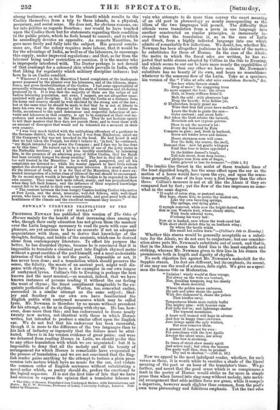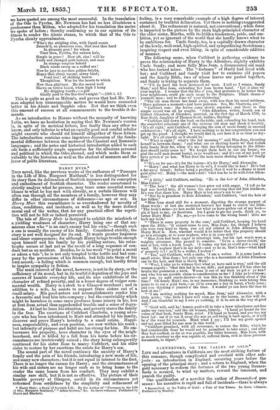NEWIIIN'S UNRHYMED TRANSLATION OF THE ODES OF HORACE. * PROFESSOR NEwsfax
has published this version of The Odes of Horace mainly for the benefit of that increasing class among us, who, though their early education has not given them the mastery over the Latin language necessary to read its poets with ease and pleasure, are yet anxious to have an accurate if not an adequate acquaintance with them, and to derive that knowledge of the thoughts, feelings, and habits of the ancients, which can be derived alone from contemporary literature. To effect his purpose the better, he has discarded rhyme because he is convinced that it is impossible to translate a classical poet into English rhymed metre without a great sacrifice of the poet himself, and a most undesirable intrusion of that which is not the poet's. Impossible or not, it Las never been done; and a translation which should preserve the sense, the felicity, the music of an ancient poet, might well dis- pense with rhyme. We have a few examples in our own tongue of unrhymed lyrics. Collins's Ode to Evening is perhaps the best known and the most musical,—so musical, indeed, that we have known instances of persons reading it without the ear feeling the want of rhyme ; the finest compliment imaginable to the ex- quisite perfection of its rhythm. Wartou, too, somewhat earlier, succeeded in a similar attempt on the same subject ; Shel- ley and Southey in our own sera have familiarized the English public with unrhymed measures which may be called lyric. Mr. Newman is therefore by no means without precedent for his attempt, so far as in dispensing with rhyme. He has, how- ever, done more than this ; and has endeavoured. to frame nearly twenty new metres, not identical with those in which Horace writes, but intended to produce a similar effect upon the English ear. We do not feel that his endeavour has been successful, though it is more to the difference of the two languages than to his lack of industry or ingenuity that the failure must be attri- buted. There is in his version evidence of great pains; and were we debarred from reading Horace in Latin, we should prefer this to any other translation with which we are acquainted : but it is impossible to deny that all the melody and all the beauty of arrangement for which Horace is remarkable have evaporated in the process of translation ; and we are not convinced that the Eng- lish reader gains anything by the attempt to torture a plain prose version into metres which have no music for the ear, and violate the common order of English sentences without substituting a novel order which, as poetry should do, prefers the emotional to the logical sequence. It is not the first time of late that we have had occasion to express the opinion that a translator labours in • The Odes of Horace, Translated into Unrhyrned Metres, with Introductions and Notes. By P. W. Newman, Professor of Latin, University College, London. Pub- lished by Chapman. vain who attempts to do more than convey the exact meaning of an old poet in phraseology as nearly corresponding as the idiom of the two languages will permit. The difficulty that attends verse translation from a poem in one language into another constructed on similar principles, is immensely in- creased when the translation is, as in the ease of Latin and Greek, from a highly inflected language into one which admits of remarkably few inflections. We doubt, too, whether Mr. Newman has been altogether judicious in his choice of the metrcs he substitutes for those of Horace. In the case of the Aleaie, the metre in which the finest odes are written, he has re- jected that noble stanza adopted by Collins in the Ode to Evening, and which seems to our ear to have more nearly the capabilities of the Alcaic stanza than any other we have seen. Mr. Newman's substitute has no beauty of its own, and bears no resemblance whatever to the sonorous flow of the Latin. Take as a specimen his version of the " Vides ut alto stet nice candidum Soracte," &c. "See how white Soracte stands
Deep of snow! the staggering trees No more support the load : the rivers Halt, in frosty stiffness fetter'd.
Melt the cold : with plenteous logs Heap the hearth : from Sabine jar, 0 Thaliarchus, largely grant me Wine that four full years have mellow'd.
Leave the Gods to guide the rest-- Gales contend ; and ocean boils : But when the Gods rebuke the turmoil, Mountain ash nor cypress quivers.
Shun to ask the morrow's lot : Every day bestowed by Fate Compute as gam; and, fresh in boyhood, Scorn not tender loves and dances.
Hoary sternness soon will come. Now the field, the course, the mall.
Demand thee : now let gentle whispers
Find thee true to hours appointed ; Or the bidden damsel's laugh, Tell-tale sweet, from deep recess; And pledges torn from arm or finger, Little grieved to lose its treasure."—(Ode i. 9.) The iambic line thrust in the midst of three trochaic lines of the least dignified length, has the same effect upon the ear as the
motion of a horse would have upon the eye, and upon the sensa-
tions generally, if one of its legs were a foot longer than the other three. Collins's measure is not at all like the .Alcaic if they are compared foot by foot ; yet the flow of the two impresses us some- what in the same degree.
"If aught of oaten stop, or pastoral song, May hope, chaste Eve, to soothe thy modest ear, Like thy own brawling springs, Thy springs, and dying gales ;
0 nymph reserved, while now the bright-haired sun
Sits in yon Western tent, whose cloudy skirts, With brede etherial wove, O'erhang his wavy bed : Now air is hushed, save where the weak-eyed bat With short shrill shriek flits by on leathern wing; Or where the beetle winds
His small but sullen horn."—(Collins's Ode to Evening.)
Whether this stanza would be generally acceptable as a substi- tute for the Alcaie, we do not care to conjecture; but one consider- ation alone puts Mr. Newman's substitute out of court, and that is, that in the Alcaie stanza the third line is the least emphatic and striking, whereas Mr. Newman gives to this line in his stanza the prominence both in length and dignity of rhythm. No such objection lies against Mr. Newman's makeshift for the Sapphic stanza. Its feet are different, but its emphasis, its accent, if one may use the word of a stanza, falls right. We give as a speci- men the famous Ode on Moderation.
" Licinius ! wisely would'st thou voyage, Not alway on the wide sea venture, Nor, dreading tempests, hug too closely The shore deceitful.
Whose the golden mean embraces, He safe and sober shuns the garret With dirt dishonour'd, shuns the palace That kindles envy.
Tempestuous blasts more rudely buffet The mighty pine : with heavier ruin Fall lofty tow'rs; and lightnings shatter The topmost mountains.
A heart well trained will hope in adverse And fear in happy time—reverses. Jove brings again the ugly winters, But soon removes them.
A present ill lasts not for ever : For sometimes with the lyre Apollo Awakes the silent muse, nor alway The bow is straining.
In times of strait show manly spirit And active zeal ; but when the breezes Too gusty waft thee then be prudent • Thy sail to shorten."—(Ode ii. 10.) Now we appeal to the most indulgent reader, whether, for such verses as these, it is worth while to sacrifice a shade of ihe literal meaning of the poet or an hour of the translator's time. We go farther, and assert that the good sense which is so conspicuous a trait in the poetry of Horace would strike us far more in simple prose than when turned into sing-song without melody, into metri- cal arrangement that adds neither force nor grace, while it compels a departure, however much slighter than common, from the poet's own terse phraseology and felicitous emphasis. Yet the two odes
we have quoted are among the most successful. In the translation of the Ode to Pyrrha, Mr. Newman has had no less illustrious a predecessor than Milton, who adopted for his translation the metre we spoke of before ; thereby confirming us in our opinion of its fitness to render the Alcaio stanza, to which that of the Ode to Pyrrha closely approximates.
"Who's the stripling slim, with liquid scents Drench'd, on plenteous rose, that sues thee hard In pleasant grot ? for whom Tiest thou, Pyrrha, thy auburn hair, Simple in grace ? How oft, alas ! will he Faith and changed gods lament, and soon In strange surprise behold Black winds sweep on a ruffled sea!
Now he joys to eye thee golden-bright, Hopes thee alway vacant, alway kind; Fond fool! of shifting breeze Thoughtless. Woe for the hearts to which Now thou gliterest. Me the sacred wall Shows on votive board, when high I hung My dripping weeds ;—a gift Gladly paid to the Sea-God's might."—(Ode i. 5.)
This is quite as good as Milton's, and proves that had Mr. New- man adopted less unmanageable metres he would have succeeded better in his .Alcaic and Sapphic odes. Not that we think even this amount of success at all commensurate to the trouble it de- mands.
As an introduction to Horace without the necessity of knowing Latin, we have no hesitation in saying that Mr. Newman's version is, in spite of its metrical fetters, less faulty than any other we know, and only inferior to what an equally good and careful scholar might execute who should rid himself altogether of these fetters. The introduction contains some ingenious discussion of the funda- mental difference between the metres of the Classical and Romantic languages ; and the notes and historical introduction added to each ode form a sufficiently ample apparatus for the allusions personal and political in which the Odes abound, and which make them so valuable to the historian as well as the student of manners and the lover of polite literature.



























 Previous page
Previous page